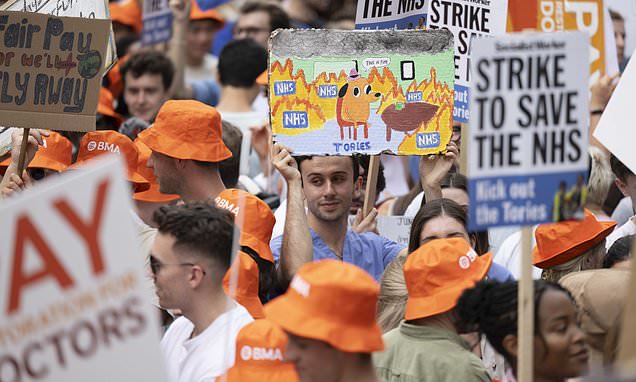DAILY MAIL COMMENT: Doctors play politics at patients’ expense
How terribly dispiriting that a fresh cohort of newly qualified doctors have been arriving at their hospitals full of enthusiasm and vigour, only to be called straight out on strike.
What a shocking example for the British Medical Association to set to its newest intake. Forget patient welfare, everybody out! So much for the Hippocratic oath.
For five days they will be kicking their heels – time they should have spent learning the early lessons of their chosen vocation.
It is the fifth round of this spiteful and unnecessary industrial action, which has cost the NHS £1billion it can ill afford and led to the cancellation of 800,000 appointments. Largely as a result, the waiting list has climbed to 7.6million and NHS productivity has plummeted.
With breathtaking arrogance, Dr Robert Laurenson, co-chairman of the BMA’s junior doctors committee, blames the Government for his union’s militancy.

The fifth round of industrial action has cost the NHS £1billion and led to the cancellation of 800,000 appointments (File image)
He and his colleagues have ‘no choice’ but to strike, he says, adding: ‘The Government should be ashamed.’ It is a risible exercise in self-delusion.
Of course, junior doctors have a choice. They could stop playing politics, accept the fair and reasonable double-digit pay rise they have been offered and get back to work. They are demanding a clearly unaffordable 35 per cent, roughly the amount they claim their real pay has fallen since 2008. Even if that figure is accurate, it needs to be seen in context.
READ MORE: Striking junior doctors accused of ‘politically-motivated’ campaign to bring down Government, as health bosses warn their walkouts have cost NHS £1billion
In the intervening years we have had a banking crash, austerity, Covid, a cost of living crunch and an energy crisis caused by a European war.
Millions of workers saw real-terms pay cuts over that period and unlike doctors, their pensions also suffered. But do they strike for a 35 per cent pay rise? Of course not.
On BBC Radio 4 yesterday, Dr Laurenson – a 29-year-old ex-public schoolboy from a wealthy family – let slip how much this dispute is fuelled by anti-Tory politics.
While he believed the BMA could have ‘a working relationship’ with the Left-wing Scottish government, UK ministers had been guilty of ‘betrayal’ and could not be trusted.
It’s hard to see why this man became a doctor at all. He seems far more interested in playing politics than treating patients.
He and his colleagues should know that actions have consequences, and it is quite possible that people will die – indeed may already have died – because of their intransigence. That is something they will have forever on their conscience.
A balance of rights
In hospital, patients can feel singularly vulnerable. They may be fretting over an operation to come, convalescing from treatment already administered or simply anxious about having to cede control over their lives to others. So it’s vital they are made to feel as secure as possible.
There are good reasons, therefore, for strict NHS rules prohibiting hospitals from placing men and women in neighbouring beds. They can, however, allow biological males who identify as women – even only part of the time – to share female-only wards.

There are good reasons for strict NHS rules prohibiting hospitals from placing men and women in neighbouring beds (File image)
Understandably, campaigners believe this would make some women highly uncomfortable and makes a mockery of the rules. Tory MP Nick Fletcher believes it poses an unacceptable risk to safety.
The arguments around trans rights are, of course, vexed and frequently over-heated. There are people who believe they have been born in the wrong sex and wish to change.
But the rights of trans women to access female safe spaces have to be balanced against the rights of biological women who may object or feel fearful about sharing such areas.
The NHS, of all organisations, must get that balance right. It should review this controversial policy as a matter of urgency.
Source: Read Full Article

